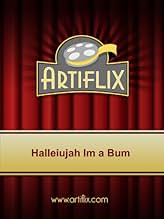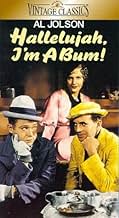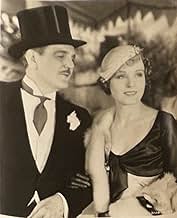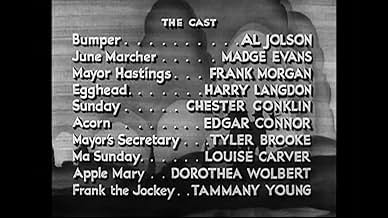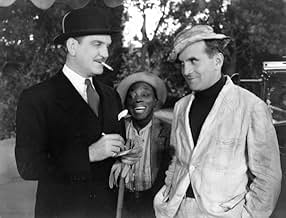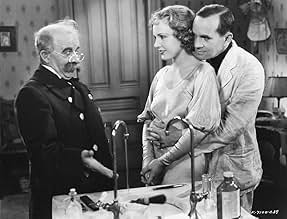Aggiungi una trama nella tua linguaA New York tramp (Jolson) falls in love with the mayor's amnesiac girlfriend after rescuing her from a suicide attemptA New York tramp (Jolson) falls in love with the mayor's amnesiac girlfriend after rescuing her from a suicide attemptA New York tramp (Jolson) falls in love with the mayor's amnesiac girlfriend after rescuing her from a suicide attempt
- Regia
- Sceneggiatura
- Star
Ernie Adams
- Man Thrown out of Apartment Building
- (non citato nei titoli originali)
Vince Barnett
- Assistant
- (non citato nei titoli originali)
Ted Billings
- Bum with Violin
- (non citato nei titoli originali)
Heinie Conklin
- Bum
- (non citato nei titoli originali)
Gino Corrado
- Mayor's Chef
- (non citato nei titoli originali)
John George
- Bum
- (non citato nei titoli originali)
Harold Goodwin
- Len
- (non citato nei titoli originali)
Recensioni in evidenza
Slap-happy musical film that tries to use music and images together to meld a new format -- and ends up entertaining and likeable. Many of the songs are "recited" in operatic fashion, as when Jolson, the "Mayor of Central Park" (a famous bum) sings his case in court against a singing tribunal that he's been brought before on chargest of betraying his office by taking a job at a bank. A wonderful tracking shot introduces his job through sucessive levels of importance, beginning with high rollers and ending up with lyricist Lorenz Hart telling a customer he doesn't have a dime to give him. After we see all the varying levels of importance in the bank, we finally come on Jolson and his friend, doing the banking equivalent of peeling potatoes. Wonderful charm of Jolson and Langdon is dulled slightly by Morgan and Evans' stiff leads.
Rodgers music and Hart's lyrics are splendid, making this one of the most original, best written original musicals of all time. It should be noted that in his years later working with Oscar Hammerstein, Rodgers only wrote one original play for film (excluding the televised "Cinderella") -- "State Fair" -- which in my opinion, though charming, has got nothing on "Hallelujah, I'm a Bum!" After the failure of this and several other Rodgers/Hart film projects, the duo returned to Broadway to become almost its only reliably successful writers in the later 30s. They left behind this little Hollywood gem to be rediscovered.
Rodgers music and Hart's lyrics are splendid, making this one of the most original, best written original musicals of all time. It should be noted that in his years later working with Oscar Hammerstein, Rodgers only wrote one original play for film (excluding the televised "Cinderella") -- "State Fair" -- which in my opinion, though charming, has got nothing on "Hallelujah, I'm a Bum!" After the failure of this and several other Rodgers/Hart film projects, the duo returned to Broadway to become almost its only reliably successful writers in the later 30s. They left behind this little Hollywood gem to be rediscovered.
I'm not much of a fan of musicals but have always been partial to the stylish, sophisticated and sometimes dazzlingly experimental examples of the genre that emanated during the early years of Talkies - the Lubitsch films, Rouben Mamoulian's LOVE ME TONIGHT (1932) and also the delightful French films of Rene' Clair.
To these I can now add this Al Jolson vehicle directed by one of the great exponents of American cinema (at his best during the 1930s, though he continued to work steadily till 1962). This was only my 3rd Jolson film - not counting THE JOLSON STORY (1946), the first of two biopics made while he was still living!; the others were his history-making debut THE JAZZ SINGER (1927), the pioneering Sound picture, and ROSE OF WASHINGTON SQUARE (1939) - actually, his penultimate film, by which time he had been relegated to supporting roles!
Anyway, the film under review here is something of an oddity in that, not only does it present such humdrum fare as the Great Depression through the eyes of a cheerful tramp and his 'colleagues', but it also makes use of rhyming dialogue (whch in the trailer included on the DVD is ballyhooed as a new fad, but it obviously couldn't last!) which was perhaps intended as a natural lead into the songs; in fact, rather than by official screenwriter S.N. Behrman (adapting a Ben Hecht story), these lines were written by lyricist Lorenz Hart! Unfortunately, however, the print utilized for the MGM/UA DVD is quite battered with the soundtrack coming off rather muffled as a consequence!!
Still, its essential quality remains intact: while the plot may seem dated and even fanciful today (both its romanticized view of unemployment and the hero's eventual decision to 'reform' on account of a woman), atmosphere and characterization are as charming as ever: Jolson, dubbed by his cronies "The Mayor Of Central Park" truly comes off as larger-than-life here, but he's matched by the great Silent comedian Harry Langdon (in his only notable Talkie role) - as one of Jolson's pals, a politically-savvy street-cleaner named Egghead(!) who's picked on by the other tramps because he has a job - and Frank Morgan as the real Mayor of New York (whose life Bumper, the Jolson character, had saved during a protest).
The film also involves a three-way romance between Jolson, Morgan and lovely leading lady Madge Evans: she's the latter's girlfriend but, having incurred his distrust, leaves him intent on committing suicide; she's saved by Jolson and, now an amnesiac, Evans is cared for by him who, in order to pay the rent of her new lodgings, even asks his friend Morgan for a job in a bank!; however, noticing Morgan's own concern about his missing girlfriend, Jolson tries to console him...until he realizes just who she is, after which he decides to re-unite the two of them and himself goes happily back to a life on the streets!
Many films have dealt with the theme of the Great Depression but this one's certainly its most original treatment while also being, along with the marvelous screwball comedy MY MAN GODFREY (1936), one of the very best.
To these I can now add this Al Jolson vehicle directed by one of the great exponents of American cinema (at his best during the 1930s, though he continued to work steadily till 1962). This was only my 3rd Jolson film - not counting THE JOLSON STORY (1946), the first of two biopics made while he was still living!; the others were his history-making debut THE JAZZ SINGER (1927), the pioneering Sound picture, and ROSE OF WASHINGTON SQUARE (1939) - actually, his penultimate film, by which time he had been relegated to supporting roles!
Anyway, the film under review here is something of an oddity in that, not only does it present such humdrum fare as the Great Depression through the eyes of a cheerful tramp and his 'colleagues', but it also makes use of rhyming dialogue (whch in the trailer included on the DVD is ballyhooed as a new fad, but it obviously couldn't last!) which was perhaps intended as a natural lead into the songs; in fact, rather than by official screenwriter S.N. Behrman (adapting a Ben Hecht story), these lines were written by lyricist Lorenz Hart! Unfortunately, however, the print utilized for the MGM/UA DVD is quite battered with the soundtrack coming off rather muffled as a consequence!!
Still, its essential quality remains intact: while the plot may seem dated and even fanciful today (both its romanticized view of unemployment and the hero's eventual decision to 'reform' on account of a woman), atmosphere and characterization are as charming as ever: Jolson, dubbed by his cronies "The Mayor Of Central Park" truly comes off as larger-than-life here, but he's matched by the great Silent comedian Harry Langdon (in his only notable Talkie role) - as one of Jolson's pals, a politically-savvy street-cleaner named Egghead(!) who's picked on by the other tramps because he has a job - and Frank Morgan as the real Mayor of New York (whose life Bumper, the Jolson character, had saved during a protest).
The film also involves a three-way romance between Jolson, Morgan and lovely leading lady Madge Evans: she's the latter's girlfriend but, having incurred his distrust, leaves him intent on committing suicide; she's saved by Jolson and, now an amnesiac, Evans is cared for by him who, in order to pay the rent of her new lodgings, even asks his friend Morgan for a job in a bank!; however, noticing Morgan's own concern about his missing girlfriend, Jolson tries to console him...until he realizes just who she is, after which he decides to re-unite the two of them and himself goes happily back to a life on the streets!
Many films have dealt with the theme of the Great Depression but this one's certainly its most original treatment while also being, along with the marvelous screwball comedy MY MAN GODFREY (1936), one of the very best.
HALLELUJAH I'M A BUM (United Artists, 1933), directed by Lewis Milestone, with music and lyrics by Richard Rodgers and Lorenz Hart, and starring Al Jolson in his only film for United Artists, is a musical oddity at best that reportedly had failed at the box office when released in theaters, and later went through reissues under different film titles ("Heart of New York") and shorter prints. I first came across this particular movie once on a local TV channel (WTAF, Channel 29, in Philadelpha) in April 1978 titled "Hallelujah, I'm a TRAMP," in which the version I saw was not only choppy but obviously re-dubbed during the song numbers. Fortunately, MGM/UA home video and later DVD copy that's currently available is restored to its full 84 minutes with the picture and sound so clear that it gives the impression that the movie itself was made only a few years ago. So my review will be taken from the basis of that.
Bumper (Al Jolson), a drifting hobo with Acorn (Edgar Connor), his tag-along black companion, return to New York City from Florida. Bumper is close friends with the New York Mayor, John Hastings (Frank Morgan), who pleasures in giving Bumper some money whenever its needed for him. Bumper and his hobo pals sleep on park benches in Central Park while Hastings has problems of his own with his mistress, June Marcher (Madge Evans), whom he believes is being unfaithful with another man named Len. However, after patching things up again while dining together, John gives her a $1,000 bill to put in her purse. However, June misplaces the purse with the money, and when John learns of it, he jumps to his own conclusions in believing she gave Len the money. After a quarrel, John walks out on her. But in reality, the purse got mixed up with the dishes by a waiter and tossed in the trash outside. Bumper and Acorn find the purse and Bumper decides to return it to the rightful owner, the owner being June. By then, June has already left her luxurious apartment disillusioned, with the intentions of not returning. Before leaving, she leaves a note for John. After coming to June's apartment, Hastings finds Bumper waiting there with the purse and explains how he got it. John realizes that June has told the truth and feels foolish. By then, June has headed for Central Park where, later that night, decides to plunge from a bridge to the river below and drown herself. The drifter Bumper sees this and rescues her. Trying to find out who she is, Bumper soon learns the girl has amnesia, and decides to look after her and call her "Angel." He falls desperately in love with "Angel," much to the dismay of his hobo pals, and decides to go to work in a bank to obtain enough money to keep her in an apartment and support her. When he learns who June really is, he is faced with the decision of returning her to Mayor Hastings or to keep silent and keep her all to himself.
The plot as it is somewhat echoes Charlie Chaplin's 1931 silent CITY LIGHTS in which Charlie plays a tramp who befriends a blind girl and goes to work to support her. Here, Jolson's Bumper befriends a girl with amnesia (with both girls being beautiful blondes). Something somewhat new at the time of its release is the rhyming dialogue with songs that accompanied HALLELUJAH I'M A BUM, an experiment that failed to click, although experimented earlier in two Maurice Chevalier 1932 Paramount musicals, ONE HOUR WITH YOU and LOVE ME TONIGHT, the latter scored by Rodgers and Hart. The Jolson version is a new experience for viewers that should be ranked as one of his most atypical film roles. There are no "Mammy" songs and no "blackface" performances either, both which have become traditional and commonplace in a Jolson movie. The Rodgers and Hart rhyming songs/dialogue includes: "Bumper, Bumper," "I Gotta Get Back to New York," "My Pal Bumper," "Hallelujah, I'm a Bum" (two different versions); "Laying the Cornerstone" (a restored segment featuring Frank Morgan and school kids); "Dear June," "Bumper Found a Grand," "What Do You Want With Money?" "Kangaroo Court," "I'd Do It Again" and the best song of all, "You Are Too Beautiful," which is underscored during the film's tender moments. Only the "Kangaroo Court" segment comes off as the only slow point to the story.
HALLELUJAH I'M A BUM (which premiered October 8, 2009, on Turner Classic Movies) also presents Frank Morgan in a rare performance as a serious romantic leading man; Madge Evans as his charming girlfriend who adds beauty to her role; and two former silent screen comedians in speaking parts, Harry Langdon as Egghead; and Chester Conklin as Sunday, adding some humor to the story. The best comedy bit is Louise Carver as Sunday's wife, a no-nonsense landlady who enjoys evicting her tenants for even being minutes late with the rent. Jolson's facial expression after he meets and sees her "charming face" is priceless. The movie is highly recommended, unless a viewer has problems sitting through a movie with mostly rhyming dialogue and no dance numbers. So that there will be no misunderstanding, the storyline does include moments of natural dialogue. (***1/2)
Bumper (Al Jolson), a drifting hobo with Acorn (Edgar Connor), his tag-along black companion, return to New York City from Florida. Bumper is close friends with the New York Mayor, John Hastings (Frank Morgan), who pleasures in giving Bumper some money whenever its needed for him. Bumper and his hobo pals sleep on park benches in Central Park while Hastings has problems of his own with his mistress, June Marcher (Madge Evans), whom he believes is being unfaithful with another man named Len. However, after patching things up again while dining together, John gives her a $1,000 bill to put in her purse. However, June misplaces the purse with the money, and when John learns of it, he jumps to his own conclusions in believing she gave Len the money. After a quarrel, John walks out on her. But in reality, the purse got mixed up with the dishes by a waiter and tossed in the trash outside. Bumper and Acorn find the purse and Bumper decides to return it to the rightful owner, the owner being June. By then, June has already left her luxurious apartment disillusioned, with the intentions of not returning. Before leaving, she leaves a note for John. After coming to June's apartment, Hastings finds Bumper waiting there with the purse and explains how he got it. John realizes that June has told the truth and feels foolish. By then, June has headed for Central Park where, later that night, decides to plunge from a bridge to the river below and drown herself. The drifter Bumper sees this and rescues her. Trying to find out who she is, Bumper soon learns the girl has amnesia, and decides to look after her and call her "Angel." He falls desperately in love with "Angel," much to the dismay of his hobo pals, and decides to go to work in a bank to obtain enough money to keep her in an apartment and support her. When he learns who June really is, he is faced with the decision of returning her to Mayor Hastings or to keep silent and keep her all to himself.
The plot as it is somewhat echoes Charlie Chaplin's 1931 silent CITY LIGHTS in which Charlie plays a tramp who befriends a blind girl and goes to work to support her. Here, Jolson's Bumper befriends a girl with amnesia (with both girls being beautiful blondes). Something somewhat new at the time of its release is the rhyming dialogue with songs that accompanied HALLELUJAH I'M A BUM, an experiment that failed to click, although experimented earlier in two Maurice Chevalier 1932 Paramount musicals, ONE HOUR WITH YOU and LOVE ME TONIGHT, the latter scored by Rodgers and Hart. The Jolson version is a new experience for viewers that should be ranked as one of his most atypical film roles. There are no "Mammy" songs and no "blackface" performances either, both which have become traditional and commonplace in a Jolson movie. The Rodgers and Hart rhyming songs/dialogue includes: "Bumper, Bumper," "I Gotta Get Back to New York," "My Pal Bumper," "Hallelujah, I'm a Bum" (two different versions); "Laying the Cornerstone" (a restored segment featuring Frank Morgan and school kids); "Dear June," "Bumper Found a Grand," "What Do You Want With Money?" "Kangaroo Court," "I'd Do It Again" and the best song of all, "You Are Too Beautiful," which is underscored during the film's tender moments. Only the "Kangaroo Court" segment comes off as the only slow point to the story.
HALLELUJAH I'M A BUM (which premiered October 8, 2009, on Turner Classic Movies) also presents Frank Morgan in a rare performance as a serious romantic leading man; Madge Evans as his charming girlfriend who adds beauty to her role; and two former silent screen comedians in speaking parts, Harry Langdon as Egghead; and Chester Conklin as Sunday, adding some humor to the story. The best comedy bit is Louise Carver as Sunday's wife, a no-nonsense landlady who enjoys evicting her tenants for even being minutes late with the rent. Jolson's facial expression after he meets and sees her "charming face" is priceless. The movie is highly recommended, unless a viewer has problems sitting through a movie with mostly rhyming dialogue and no dance numbers. So that there will be no misunderstanding, the storyline does include moments of natural dialogue. (***1/2)
It's hard for most of today's audience to imagine why Al Jolson was once considered the world's greatest entertainer. The well-known clips from THE JAZZ SINGER are more of an embarrassment today than something to be proud of, and he hasn't had much of his recorded legacy in print recently, and what is often tends to be later re-recordings. HALLELUJAH I'M A BUM is one of the best examples of Jolson's charm and wit as a performer and although the film is a quirky period piece, it should be of interest to anyone who appreciates musical theater. While the film features "songs," it also features dialog that is spoken to a beat and to a musical background. It's difficult to describe, but it's charming. Jolson plays Bumper, unofficial "Mayor" of the "bums" of New York. He's accompanied by a short Black sidekick named Acorn played by Edgar Connor, a very talented man (also seen in the infamous "Rufus Jones For President" short with the young Sammy Davis Jr. and Ethel Waters). Other colorful characters include the great Harry Langdon as the Marxist trash collector (his scenes with Jolson are wonderful...I think I read once that his part had been cut down somewhat. A shame the outtakes don't survive), and silent comedy legend Chester Conklin as Sunday, who operates a horse and carriage. Frank Morgan as the mayor of the REAL New York City, and Madge Evans as the mayor's amnesia-suffering girlfriend (whom Jolson saves from drowning herself) represent the "Straight" non-bum world, which Bumper and Acorn briefly join, but cannot find happiness in. I'm don't know a lot about the Rodgers and Hart team, but their songs and dialog are still fresh sounding today, and they created a wonderful vehicle for Al Jolson that, unintentionally, may well be the best documentation of him for the modern viewer. This is NOT a film that you may always be in the mood to watch. I can imagine many viewers catching a little of the romanticized homeless people reciting "Musical dialog" and scratching their heads in confusion. I don't usually like musicals (I bought the film back when it came out on VHS because Harry Langdon was in it), but I was won over by it and I can imagine I'll watch it again in a year or two and show it to friends who are involved in musical theater. Check it out if the above description sounds interesting!
This upbeat depression era musical features Broadway sensation Al Jolson as hobo king Bumper. Living in Central Park he and his followers choose a life of leisure to wage slavery debating it in song and rhyme with among others a Red grounds keeper. Even though he's a confidant of the mayor he prefers his laid back lifestyle to patronage work. One night Bumper saves a woman who throws herself off the Bow Bridge. Stricken with amnesia she takes up with Bumper who falls hard enough for her to get a job. When Bumper's "Angel" get's her memory back things change and Bumper returns to his previous vocation.
By 1933 massive unemployment stretched across the land and I can only imagine what the audience reaction of the time might be regarding a musical that extols the joy of joblessness. Jolson's popularity was on the wane having been supplanted by Bing Crosby but he still had enough draw in his voice to make Hallalueh, I'm a Bum a moneymaker and the flimsy story written with sly subversiveness by Ben Hecht does have a light satiric humor to it.
Edgar Conor as sidekick Acorn and silent film clowns Harry Langdon and Chester Conklin add to the film's amiability while Madge Evans as the amnesiac retains a sinewy seductiveness in an evening gown she wears for days on end. Director Lewis Milestone adds his usual camera movements with a striking tableaux here and there but there is also some sloppy back projection and pedestrian editing that gives the finished product a rushed feel. Overall though Hallalueh, I'm a Bum is an oddly interesting take on tough times featuring a legendary talent in fine form.
By 1933 massive unemployment stretched across the land and I can only imagine what the audience reaction of the time might be regarding a musical that extols the joy of joblessness. Jolson's popularity was on the wane having been supplanted by Bing Crosby but he still had enough draw in his voice to make Hallalueh, I'm a Bum a moneymaker and the flimsy story written with sly subversiveness by Ben Hecht does have a light satiric humor to it.
Edgar Conor as sidekick Acorn and silent film clowns Harry Langdon and Chester Conklin add to the film's amiability while Madge Evans as the amnesiac retains a sinewy seductiveness in an evening gown she wears for days on end. Director Lewis Milestone adds his usual camera movements with a striking tableaux here and there but there is also some sloppy back projection and pedestrian editing that gives the finished product a rushed feel. Overall though Hallalueh, I'm a Bum is an oddly interesting take on tough times featuring a legendary talent in fine form.
Lo sapevi?
- QuizHallelujah, I'm a Bum (1933), retitled The Heart of New York, was the first Hollywood feature film to be shown on regularly scheduled USA television. It was broadcast by W2XBS, New York City, on 5 July 1939, two months after their inauguration of regular service which had begun on 30 April 1939 with the opening of the New York World's Fair. It is one of over 200 titles in the list of independent feature films made available for television presentation by Advance Television Pictures announced in Motion Picture Herald 4 April 1942. At this time, television broadcasting was in its infancy, almost totally curtailed by the advent of World War II, and would not continue to develop until 1945-1946.
- BlooperA cameraman's arm is reflected in the partially opened window of the Mayor's limousine when the Mayor meets Bumper at the casino.
- Versioni alternativeA re-dubbed and edited version (for UK release) called "Hallelujah, I'm A Tramp" frequently turns up on television. In this version the soundtrack is momentarily erased whenever the word 'bum' is sung!
- ConnessioniFeatured in The All Talking, All Singing, All Dancing Show (1973)
I più visti
Accedi per valutare e creare un elenco di titoli salvati per ottenere consigli personalizzati
Dettagli
- Data di uscita
- Paese di origine
- Lingua
- Celebre anche come
- Happy-Go-Lucky
- Luoghi delle riprese
- Pacific Palisades, Los Angeles, California, Stati Uniti(Central Park scenes)
- Aziende produttrici
- Vedi altri crediti dell’azienda su IMDbPro
- Tempo di esecuzione
- 1h 22min(82 min)
- Colore
- Proporzioni
- 1.37 : 1
Contribuisci a questa pagina
Suggerisci una modifica o aggiungi i contenuti mancanti

